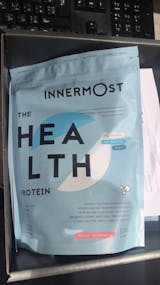If you’re looking for an article that breaks down the science surrounding the popular ZMA supplement – hello there. We’re glad you could make it.
Zinc Magnesium Aspartate, which is more commonly referred to as ZMA (as it’s a bit less of a mouthful), is a hugely popular supplement that combines the benefits of minerals Zinc, Magnesium and Vitamin B6. ZMA supplements are widely used as a result of this killer combination, as the benefits of these supplements alone (let alone with each other) are beneficial to your overall health in a heap of really great ways.
You may be thinking - why are these vitamins and minerals combined, and is that advised? Well, here at Innermost we are huge advocates for the benefits of ZMA. Any supplements that pack the benefits of all three of these vital supplements into one easy source is a no brainer to us. In fact, we love the benefits so much, that we’ve included ZMA into The Recover Capsules to help improve your performance and enhance your recovery.
Before you start implementing ZMA into your routine, it’s good to read into some research and facts surrounding the supplement. That’s where we come in! So let’s dive into some of that all-important information and get you on board and clued up with all things ZMA supplements, shall we?
What is ZMA?
As above, ZMA is made up of three core components: Zinc, Magnesium and Vitamin B6. There’s been a lot of research into the effectiveness of ZMA supplements, with many of these studies concluding that athletes that implemented the supplement into their routine saw significant increases in performance and strength.
Let’s break down these nutrients and find out some more about their feel-good effects on our health, wellness and performance levels.
Zinc
Zinc is a great boost to your immune system due to the nutrient's essential role in immune cell functioning. Zinc is naturally occurring, with many people choosing to take ZMA supplements to enhance their zinc levels, as zinc has been linked to an in increase their metabolism.
Magnesium
The benefits of magnesium are huge. We won’t go into too much detail here, as we’ve written an overview surrounding the benefits of magnesium supplementation here. But simply put, adding Magnesium into your diet is beneficial in reducing anxiety levels, helping with migraines and boosting exercise performance – to name but a few benefits.
Vitamin B6
Vitamin B6 is found naturally in many foods that you most likely already incorporate into your diet, including:
- Beef
- Vegetables
- Non-citrus fruits
- Tuna
- Chickpeas
This vitamin is often taken as a supplementation due to it's important role in regulating your memory and maintaining your mood. Vitamin B6 is also a key player in the creation of red blood cells, so it's important that you maintain healthy levels of this vitamin in your diet.
Who takes ZMA?
Generally speaking, ZMA is a pretty popular supplement amongst groups such as bodybuilders, high-intensity athletes and those that train regularly. This is because of the range of benefits that supplementation presents, which helps in areas ranging from sleep quality to muscle growth.
Many athletes also opt to take ZMA supplements as a healthy, natural replacement for anabolic steroids, due to the risks that taking these carry.
The health benefits of ZMA
Strap in, because this list is pretty long.
- Improves physical endurance levels
- Enhances recovery processes
- Boosts muscle growth
- Aids in sleep quality
- Improved immunity
- Ups your mood
- Helps control blood sugar levels
- Reduces inflammation
- Aids weight-loss
- Reduces your appetite
So, should I be taking ZMA supplements?
The answer to this can come from asking yourself a couple of pretty simple questions:
- Are you feeling tired at the end of everyday?
- Are you struggling to incorporate Zinc, Magnesium or B6 into your diet?
- Could you do with that extra boost?
If the answer to any of the above questions is yes, then we would wholeheartedly recommend you give ZMA supplements a try.
Are there any health risks?
As with everything we put into our body, it’s important to know if there are any risks. With ZMA, there are no known side effects, but as with all supplementations, ensure you are taking the correct, recommended daily dose.
The Recover Capsules
When starting to incorporate a new supplement into your routine, you might be feeling a little bit overwhelmed with who to trust and where to start. Formulated by leading nutritionists, The Recover Capsules include ZMA as well as other active ingredients such as Selenium and Vitamin D.
Summary
Basically, ZMA supplements improve your health and wellbeing in a wealth of areas, so you can see why it’s pretty popular with fitness enthusiasts.
If you’re looking to improve your performance, ZMA supplementation will assist in any deficiencies as a result of your diet plan. For example, body builders commonly focus on a protein-rich diet, leaving room for zinc deficiency. If you’re looking to improve your sleep, the included zinc and magnesium will help you on you out with that.
It’s all about the balance.
References
- Moëzzi, N., Peeri, M., & Matin, H. (2013). Effects of zinc, magnesium and vitamin B6 supplementation on hormones and performance in weightlifters. Ann. Biol. Res, 4, 163-168. Click here.
- Khorsandi, H., Nikpayam, O., Yousefi, R. et al. (2019). Zinc supplementation improves body weight management, inflammatory biomarkers and insulin resistance in individuals with obesity: a randomized, placebo-controlled, double-blind trial. Diabetol Metab Syndr 11, 101.Click here.
- Sheykh, A. V. D. & Bordbar, S. (2012). Effect of ZMA supplement alone and in combination with carbohydrates, with six weeks of resistance training on anabolic hormone levels and cellular damage indexes in untrained males. Click here.
























